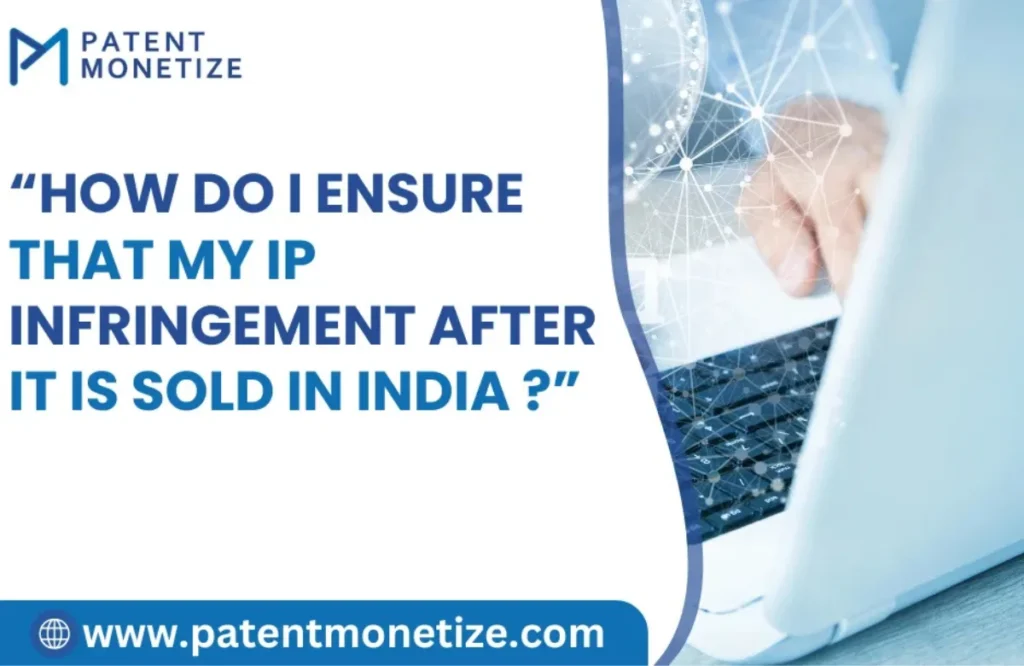
It is the most crucial and significant characteristic of business nowadays in this current era, specifically in markets such as India that are thriving, full of innovation and creativity at every moment. Because of the rapid growth of the India market with every passing minute, there exists a huge necessity to IP infringement protection of the inventor, the entrepreneur, or the company involved while selling or transferring it to some other party. This again will sell for millions and billions of dollars if it is in terms of patents, trademarks, copyrights, or even trade secrets; however, it is at this point that, after selling IP, IP infringement protection is essential at every point.
How do you protect your IP after it is sold in India?
We will take you through the procedure of protecting IP after sold out, the most important strategies, legal protections, and practical steps that you should take on your way to reduce all the risks.
What is Intellectual Property (IP)?
Intellectual property is a body of rights which the law accords an inventor or the owner of any kind of innovation, design or literary works, trademark, or any other fruit of human innovation. IP law of India mainly focuses on and follows the principles mentioned in the Patents Act, Copyright Act, Trade Marks Act, and the Designs Act-acts that solely award the exclusivity of their products to their owners and ensure others cannot utilize their work for anything.
There are some types of IP:
- Patents: Inventions or new processes
- Trademarks: Logos, brand names, slogans
- Copyrights: Literary, musical, artistic, etc.
- Trade Secrets: Confidential business information
If you sell your intellectual property that is that ownership rights and rights to use the IP might pass over to another person. But then, that would not necessarily mean that protection against misuse and infringement would be off the hook.
Why Is IP Protection Important in India?
This could be expected from India, being an innovation hotbed, where entrepreneurial ventures are born. Technology-led companies, creative industries, and high-tech start-ups will take the country through solid steps in giving it proper intellectual property protection. The Indian market is also following the trend of commercialization of intellectual property, wherein multitudes of businesses are using their potential, making revenues, and creating brand value. But awareness is also associated with IP to create higher risks for infringement, mostly after sold. If no effective safeguards are available, it gets misused by third parties or new owners with all resultant legal disputes as well as resultant economic losses owing to that.
- Arrange that the third-party risk using your IP after selling falls under your control.
- You protect your brand reputation and image against unauthorized usage or exploitation.
- You gather all the royalties or other revenues from licensing agreements, continuing partnerships.
- You prevent potential market dilution or even unfair competition by persons exploiting your IP.
Issue of Loss of Control over IP after Sale
Once intellectual property is sold, there are many issues regarding control:
- Loss of Ownership: The moment you sell your IP, you have lost all claims to ownership rights and do not have any further control over subsequent use, which means you automatically lose some kind of control over infringement.
- Non-Sound Contracts: Dealing in India is without a contract or appropriate contract documents regarding IP. Subsequently, one is thrown either into loose terms or no enforceable ones with whoever you deal with.
- Problem of Enforcement: The Indian judicial system has a huge number of cases to resolve. Furthermore, enforcing your IPs is a time-consuming and costly process for the management of infringements.
- Unaware Parties: The parties are not aware of the finer aspects of IP law and, therefore, infringe or mutualize the IP.
- Copycat Products: Piracy is predominant in technology, fashion, and pharmaceuticals, as patent infringement and trademark infringement occurs very often. Where piracy thrives, it is simple to flood the markets with pirated goods.
Nevertheless, there exist different legal protections that can shield your IP when sold or assigned in India
Protecting Your IP from Infringement in India after having been sold there
While selling intellectual property may sound easy, protecting it after the sale is a wee bit harder. There are several things that one can do in order to keep their IP under protection:
Licensing Agreement
Under a licensing agreement, the seller of the IP retains some rights in his ownership but licenses other rights to the buyer or licensee for the use of the IP for specific purposes.
How to license your IP
- Boundaries of Use: This will be in terms of establishing boundaries of use, regions covered, and the time scope of the license. This helps eliminate misuse or any form of unauthorized use away from set terms.
- Royalty Clauses: In addition, the one should also make some provisions with regards to the royalties clauses indicating how the royalty shall be computed and paid. With this, the parties can put a clause about conducting a periodical audit that shall reflect the state of compliance of the licensee with the agreed terms.
- Termination Provisions: State the conditions under which one may accept the termination of the licensing agreement; sometimes the contract is terminated on default and in some jurisdictions, it can be terminated even for violating rights of intellectual properties of others by a licensee.
Non-Disclosure and Non-Compete Provisions
With respect to IP, introduce such contract of patent sales incorporating both the provisions related to nondisclosure as well as the no duplication of their nature of service during and subsequent period from buying from your licensee.
- NDAs: The buyer will have to sign an NDA. This limits his capability of disclosing any confidential knowledge regarding the IP.
- Non-Compete Agreements: A non-compete bars the buyer from developing competitive goods or services for a certain time and area with the IP.
In case of infringement, there will be a remedy under law, and the possibility of misuse on the part of the buyer is lower.
Monitoring and Enforcement
Even after the divestment of your IP, track its usage where some infringement possibilities may arise. A few ways of tracking usage of your IP include the following
- Market Surveillance: Monitoring the market for infringing or counterfeited products that could misuse your IP.
- Trademark and Patent Watch: Monitoring new filings that may come in with your IP or to create infringing products. There would be periodical audits in order to ensure that the IP is used consonant with the terms of the agreement and third parties are not infringing. But if there exists infringement or misuse, then one must be prepared to act on it by swiftly taking legal action against it as well.
- Remedies via Law: In case of IP infringement, there are many legal remedies in India. Owners of IPs can approach courts or administrative authorities for relief.
- Civil Lawsuits: You can file a civil suit for injunction, damages, or account of profits to protect your IP rights.
- Criminal Action: In serious cases of infringement, for example, in the case of counterfeiting, you can file a criminal case under relevant IP laws.
- Customs Enforcement: For pirated products, you can have Indian Customs activated so that such infringing products cannot reach the country with the registration of IP with Customs.
- Alternative Dispute Resolution (ADR): You can also have arbitration or mediation instead of a full-fledged case in court which may drag.
All this should be clear after selling your IP with an enforceable legal framework behind it.
Read Also: USPTO Enhances Assignment Records Search: New Tool Replaces Legacy Systems by October 2025
How to Register Your IP in India
Most effective form of protection from infringement is with the registration of your intellectual property. As, in India since it would constitute as a proof or evidence for you in terms of law to gain ownership, therefore securing will be much easier to get enforced.
- Patent Registration: Always the patent should be sold through an Indian patent office.
- Trademark Registration: Whether marks concerning the usage of brand logo are registered or not with Trademark Registry properly.
- Copyright Registration: Every copyright is to be registered with Copyright Office.
- Design Registration: If you sell a design, then get it registered with Designs Act, 2000.
Registration supports proving the legitimacy of your IP and makes enforcement of legal rights whenever infringement occurs easy.
IP Protection Strategies Post-Sale
Apart from these legal protections, here are some strategies that a seller can use in post-sale protection of IP:
- Updated Agreements: Licensing, non-disclosure, and non-compete agreements must be updated along with the latest legal requirements.
- Monitoring System: Technology will track any kind of infringing activities and monitors the usage of one’s IP across the globe.
- Act to Claim Your Rights: Act immediately if you find any infringement. The sooner you act, the more likely you will be able to prevent further harm to your IP.
- Educate the Purchaser: The buyer also should be made aware of the restrictions and liabilities imposed on the IP, thus reducing the chances of its misuse.
Role of Contract in Protecting IP
The contracts are the most basic tools designed to safeguard and protect IP specifically after the act of selling it. A rightly drafted contract leaves no ambiguity within the rights of both parties interested in the concerned activity. In this regard, here are just a few major contracts prevailing on the subject protection of IP are:
- Sale and Purchase Agreement: They include agreements regarding all sale terms on transfer of title along with terms and conditions related to post-sale obligation.
- Licensing Agreements: These constitute the terms and conditions under which the buyer may make use of the IP as well as limits surrounding it.
- Confidentiality Agreements: Such agreements help to keep things confidential and bar the buyer from disclosing or misusing the IP.
A good contract keeps you safe from possible future disputes and protects your intellectual property.
Read Also: Don’t make these mistakes before selling your patent
Steps to Take Before You Sell Your IP
There are a few steps that one should take before selling the IP so that it is protected.
- IP Audit: One has to identify the strength and weakness of the IP, see which points one is weak.
- Professional Advice: There should be consulting of the legal experts, IP consultants and patent attorneys for rights protection in proper ways.
- Copyright Definition: This defines the ownership rights clearly so that the IPs are sold or transferred with legal rights. Terms cautiously negotiated and observing the sales by terms as regards to its usage and its potential enforcement
The Future: New Trends of India IP Protection:
India has covered many miles in IP protection in the last few years. The National IPR Policy that was introduced in 2016 is a step that enhances the existing mechanism for the enforcement of IP and facilitates the commercialization of IP. Digital technologies in the form of blockchain and AI have made it more prudent to track and monitor IP infringement than earlier. With India updating its laws on IP, the doors for acquiring more IP protection and the amount of IP protection that is being enhanced are opening wide.
Conclusion
It is not so easy to protect one’s intellectual property post-selling out in India; however, that does call for constructive action. All the various means available in the wake of the licensing agreement, legal remedy, and so forth are there to safeguard your rights with no infringement possibility. Your IPs would be quite safe and yielding revenue for much time even post sale with perfect contracts, track usage, or immediate actions regarding infringement.









